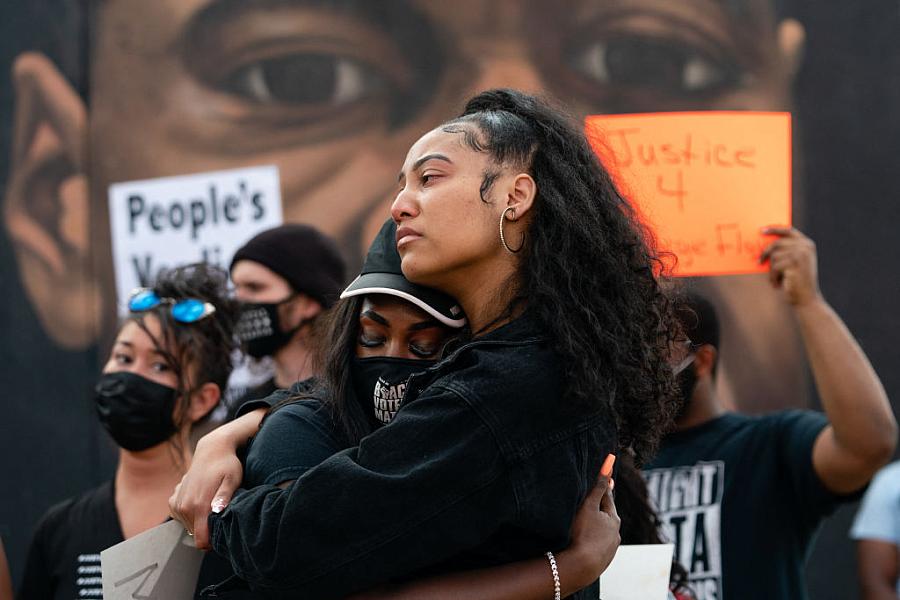How stress and obligation are undermining the health of Black 'superwomen'

(Photo by Elijah Nouvelage/AFP via Getty Images)
Cheryl Woods Giscombe is a distinguished associate professor of quality of life, health promotion and wellness at the University of North Carolina at Chapel Hill. Her research focuses on how stress leads to health disparities among African Americans. In this edited Q&A, I spoke with Giscombe about the Superwoman Schema conceptual framework, a group of five characteristics to help explain how Black women experience stress, and how these characteristics may be impacting their health during the pandemic.
Q. How did the trope of the strong Black woman come to be?
A. I can’t tell you the origin. There have been people in the past who wrote books and articles on the concept of the Black superwoman. In my research, I wanted to be able to understand the nuance of the “Superwoman Schema,” as I call it, and strength was one of the characteristics, among others. As a graduate student in 2004, I ended up doing qualitative focus groups with African American women across ages and educational levels and professions, from people who never finished high school to those with doctorates and law degrees. Based on the data they shared during those groups, that’s how I came up with the Superwoman Schema conceptual framework that has five different characteristics: Perceived obligations to present an image of strength, perceived obligations to suppress emotion, perceived obligation to resisting vulnerability and help from others, motivation to succeed despite limited resources, and caring for others, which amounts to prioritization of care giving over self-care.
The concept of the strong Black woman is not brand new, but we really didn’t have a way to operationalize it, to measure it with scale so we could understand who’s experiencing it and how it relates to conditions such as depression. We had some ideas, but the scale I created, the Superwoman Schema questionnaire, has allowed us to see the relationship these characteristics have with issues such as stress and anxiety, eating behaviors, physical activity, sleeping patterns, and physiological things like allostatic load. It’s a way to measure cardiovascular and metabolic risk and diabetes risk. A lot of research is happening right now, but we needed that scale to understand it all.
Q. Could you share a bit about what you’ve been learned?
A. We’ve learned that strength is associated with some of the problems I’ve mentioned but strength in and of itself may not necessarily be something that’s undesirable. That’s a good thing; we don’t want people to think that somehow we’re saying that it’s bad to be strong as a Black woman. Being strong is quite important to life and resilience and supporting others and getting through life’s challenges. And many of the characteristics from the schema in and of themselves aren’t necessarily harmful.
Prof. Cheryl Woods Giscombe
Some of the research I’ve done with UC Berkeley professor Amani M. Allen shows that strength might be protective against allostatic load. But what we’re finding most consistently is that the emotional suppression part and the prioritization of care giving over self-care is what needed most of our attention. If a person doesn’t have anyone to rely on and they never feel like they can put their guard down, that can be problematic.
Q. How did health inequities Black women typically experience in the U.S. impact their rates of infection and death during the pandemic?
A. That’s still out for the jury. We don’t know how the pandemic affected Black women specifically, but we can kind of imagine. My research on stress and coping is showing the links between stress and health outcomes in general. Stress is inevitable. We all experience stress in life, but Black women are at risk for higher levels of stress due to our race, gender, and for many of us, our socioeconomic status.
However, even when we have higher degrees and higher income, we have stress related to being Black and female. Even those of us with higher socioeconomic status may still have people that rely on us to support them. That’s not a bad thing in itself, but it can cause strain. Because of this intersectionality of our identities (race, gender, socioeconomic status), we’re at risk of higher levels of stress than other groups.
While other women of color also experience high rates of stress historically speaking, African American women have also been at risk of unique racism-related stressors. That includes structural racism, which not only impacts us individually but our families and communities. This has caused us to live and work in situations that are more stressful historically.
We know that stress impacts our health behaviors as well as our physiological systems, which puts us at risk for negative outcomes. Stress impacts our cardiovascular health, our neuroendocrine health, and our inflammatory system, which puts us at risk for certain cardiometabolic diseases but can also harm our immune system, making us more vulnerable to conditions that are reliant on strong immune systems to keep us safe.
Research is going on now to understand stress and COVID-19 risk, but what we do know is that Black women have higher rates of obesity, diabetes, cardiovascular disease, and other chronic illnesses and certain cancers that can make COVID-19 more detrimental to our health and more likely to cause morbidity and mortality.
Q. Dr. Susan Moore was a Black physician who posted a heart-wrenching account on social media of how her COVID-19 symptoms were being ignored, even as she lay in her hospital bed dying. With that in mind, are events like the COVID-19 pandemic more dangerous for Black women?
A. Even pre-pandemic we would hear the stories of Black women who go to the hospital during their pregnancy with mental health concerns, or cardiovascular symptoms and they’re not heard. My own grandmother, who ended up having metastatic cancer, was initially told she just had indigestion, without testing or any assessment. You have to ask yourself the big question: What do they see when they see Black women walk through the door?
There’s a very critical need for health care providers that have cultural humility.
For providers, sometimes we work so fast and it requires so much efficiency that you start thinking you know things because you’ve seen it or something similar before. You start making decisions or assumptions based on stereotypes. We need individualized care so people can get the correct diagnosis and treatment they need across racial groups. All of those things relate to understanding the patient in front of you.
Q. How has this pandemic changed the conversation around mental health among Black women, and in the Black community in general?
Thank goodness that this pandemic has helped erase the stigma around mental health issues. I think that while the pandemic has definitely created more mental health challenges, the conversations during this time have helped people see that it’s OK to say you need help and to get help.
But that means our needs are even greater, in terms of physical and mental health. This is an opportunity, because more people are listening and open to seeing health disparities for what they are, and understanding the historical, social, and political factors that contribute. This is a time to advocate for change while people’s ears and eyes are open.
It’s unfortunate we have to get to this point for this to happen, but it could do something hopefully in generations to come if we can keep that stigma reduced and people can talk about these things more freely and not have to wait until later in life to get the help that they need.

